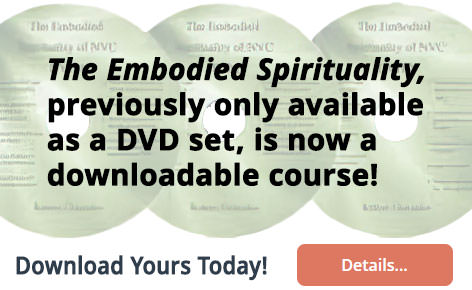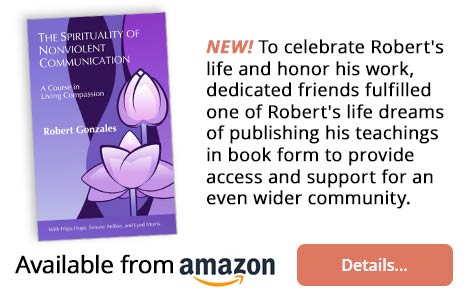

Welcome to the Robert Gonzales Training Legacy. Here you can learn more about Robert and the powerful teachings he dedicated his life to. NVC Academy is proud to house and share with you the complete body of his life's work. We invite you to explore, learn, and help keep his legacy alive!
Robert's passion was in the spirituality of the Nonviolent Communication (NVC) process. He saw NVC both as a process that helps people connect more authentically with themselves and others, and as a spiritual practice and way of living. The worldwide NVC community mourned when Robert died in 2021. He left behind a legacy of work that emerged from a lifetime of inquiry into the intersection between spirituality and human communication. More about Robert.
Practice Exercise
3 - 5 minutes
If you want to support someone in distress offer a menu of ways you can contribute. Often a person in distress can’t articulate what they need but can recognize it when they hear it. Move fluidly among these 11 options to offer what’s truly helpful, rather than offering something out habit or based on what you think they should have. Remember that you can ask, “Is this helpful?” to support collaboration.
Details...Video
11 minutes
How can Nonviolent Communication practices support us when we're feeling depressed? Taking a look at some characteristics of depression and how they're linked to unmet needs, we offer some steps to take that help you reconnect with life and others.
Details...Trainer Tip
1 - 2 minutes
Trainer Tip: Notice when you create stories about why something occurred. Commit to only observing facts. Then make decisions that are likely to give you relief and joy. For instance, if someone is late you may think that she’s inconsiderate or values another thing more than you. Instead, observe what you know—that she's later than agreed. From there, you could call her to find out what’s going on.
Details...Trainer Tip
1-2 minutes
Control may help us feel safe in an unpredictable, unsafe, wild world. Wanting control may be a response to shielding ourselves from feeling fear and being aware of our vulnerability. The more we insulate from fear, discomfort, and vulnerability, the more we are cut off from aliveness; we can become more anxious, and depressed. The more we control the more we are disconnected from empathy and care. With aliveness come joy, peace, love, awe.
Details...Practice Exercise
2-3 minutes
Often, honoring someone’s choice supports more connection. Thus, checking in with someone’s choice to listen or not (offering autonomy) sets the stage for being heard more fully. On the other hand, when someone has the perception that you are talking to them without considering their choice, resentful listening might result. Here are ways to mindfully check in about choiceful listening before starting a conversation.
Details...Trainer Tip
1 - 2 minutes
Trainer Tip: Even when it's tempting to coerce or match might with might, we can strive to meet our needs without negatively affecting others. Instead of convincing anyone to do it our way or to value the same things we value, we can focus on what we value: compassion among people and valuing everyone’s needs. By doing this we are actually more likely to meet our own needs and we are better able to live peacefully.
Details...Trainer Tip
1 - 2 minutes
Trainer Tip: Here are four Stages of Emotional Maturity, also known as Stages of Emotional Liberation. Be aware of what stage of emotional maturity you are in today. And, celebrate it.
Details...Trainer Tip
1-2 minutes
We can shift from being absorbed and identified with our inner chatter and feelings to being the space of awareness of these things. Observe your breath. Then observe your mind generating thoughts. Next, feel sensations of your body, particularly the difficult ones. Now, connect with the underlying energy of needs. Ask your unconscious mind for universal needs words related to what you now notice, think and feel.
Details...Trainer Tip
1 - 2 minutes
Trainer Tip: Without knowing our feelings, its harder to live fully present, take care of ourselves, and make sound decisions. If its difficult for you to know what you feel and to express your feelings, consider reviewing a list of feelings, practice expanding your feelings vocabulary, and naming your feelings.
Details...Practice Exercise
5-8 minutes
Grief is often confused with anguish. Anguish is a painful feeling that comes along with deep resistance to an experience or truth. Grief that leads to healing is an expansive state. It is a willingness to be with an experience and truth. If you're not resisting grief, then it's a neutral-to-pleasant experience. Pleasant sensations can include a sense of space and relief as something is integrated and tense holding releases.
Details...

